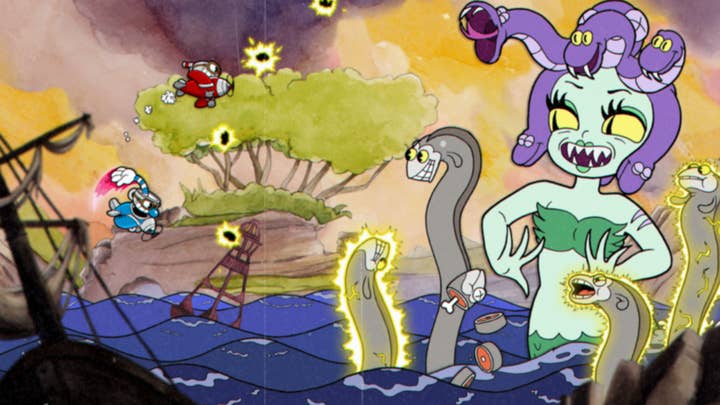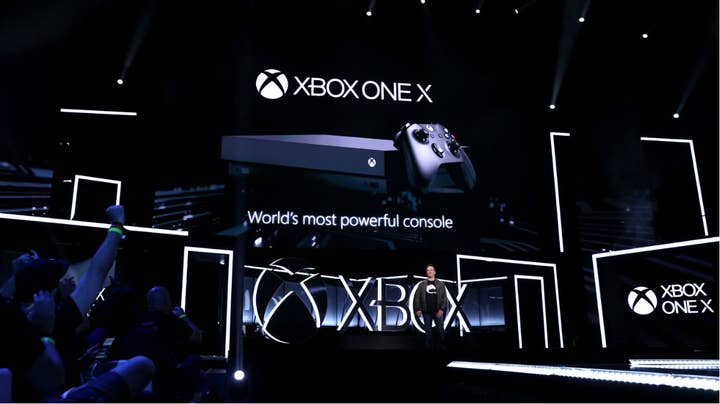Xbox doesn't need to rely on Gears and Halo - Phil Spencer
E3 2017 was about speaking to diverse audiences, says the Xbox chief, but VR is "years away" from being ready for mainstream gamers
The Xbox One will soon be entering its fourth year on shelves. Ordinarily, that would mean Microsoft would begin to shift its focus from early adopter and core gamer crowds. But with the Xbox One X arriving this year and the two systems running in parallel, the company is planning to juggle both audiences.
Speaking with GamesIndustry.biz yesterday, head of Xbox Phil Spencer pointed to this year's longer-than-usual Microsoft E3 media briefing as one example of that change.
"If you looked at what we did on stage yesterday, [there were] 42 games, 22 with console exclusivity," Spencer began. "It was a breadth of content all Xbox One gamers are going to get to play, from core early adopters--things like Anthem and Metro--but also Minecraft, Lucky's Tale, Ori... these games that I think are more family-focused and friendly. When I was thinking of the games we would put on stage and focus on for our platform, I was thinking about different geographies, different ages of people, different genres of games, and that's one of the reasons I wanted to do both on stage, the largest, most diverse lineup but also showing Xbox One X, the world's most powerful console."
"We're going to sell more Xbox One S's next year than we will X. That's always been part of the plan."
With Sony following a similar mid-cycle refresh and Nintendo introducing Switch mid-generation, the industry's formerly structured idea of console cycles teeters on the verge of chaos; a web of overlapping hardware lifespans that could make direct comparisons and target audiences difficult for platform holders and multiplatform developers alike. As difficult as it may be for companies to be forever catering to the needs of early adopters, core gamers, casual audiences, and families, Spencer would apparently welcome the situation.
"I think any healthy large ecosystem is not dependent on one customer segment at all, whether it's phone, PC, or console," he said. "To some extent, because console's been on more of a fixed console cycle, it meant there was less dexterity. At least that was the perception of it. I'm not sure about the reality of it.
"I think about the strength of the console business all up right now. It's doing really well between Switch, PlayStation, and how we're doing. Five years ago, I couldn't get a question at one of these shows that wasn't, 'Is the console dead? Isn't everyone just going to play on their iPad?' And now you see real success with all three console manufacturers. Gaming is now a $100 billion business globally with 100 million gamers. The strength all up means we're going to cater to multiple audiences at the same time, and like I said, I think that's actually a strength to the business."

Even though the majority of Microsoft's conference was built around the core market and the Xbox One X, Spencer knows it's the other end of the spectrum that will drive much of the company's business in the near future.
"You have to think about the full line of consoles, S and X. We're going to sell more Xbox One S's next year than we will X," Spencer said. "That's always been part of the plan. Price is critically important to a late adopter coming into this generation of consoles, and I expect that person is going to look at Xbox One S--now $249 in the US for a limited time--as probably the thing they will come in for. Our show was about catering to both audiences."
Xbox One X adoption will no doubt be limited in part by the price tag, and in part by the number of people who own TVs that can make the most of the 4K-capable console. Spencer downplayed the drawback, saying he's been encouraged by consumer adoption trends, noting that more than half the TVs sold in the US last holiday season for 4K sets.
"I saw it as a strength that we were able to have a strong games show and not have to rely on Gears and Halo to be part of that"
"That said, with the Xbox One X, we did some research with customers and over half the people who were interested in the console had a 1080p television," he said. "That's why we focused on things like super-sampling to make sure that even if you're running the Xbox One X on a 1080p TV, you're going to get absolutely the best experience you've ever seen on that television. It's not just about 4K television adoption driving the adoption of this."
There was never any doubt that the Xbox One X would be the big story coming out of Microsoft's E3 show, but almost as big a story could be the things that weren't at the show. For example, the iconic Xbox franchises Halo and Gears of War.
"I was proud of that, actually," Spencer said. "Here's how I think about it. We showed 42 games. We went long over our usually allotted time. I loved the games we had on stage. There weren't games where I said, 'That one should go away.' Every game had [a place]. Worldwide audience, smaller developers, big developers, service-based games, games that are as much about viewing as watching.
From most people, the reception I received is that we were able to run a great games show that went over our 90 minute time slot, and Gears and Halo weren't there. People know we own Gears and Halo, and those are important franchises for us, but I saw it as a strength that we were able to have a strong games show and not have to rely on Gears and Halo to be part of that.

"Both those teams are actively working. In the last month, I've been at both studios looking at milestone reviews and playing stuff. I could have pushed them to put together some kind of video so we could have shown something on stage, which would have been a PR thing and not a game thing, but I just said, 'No. I love the show we have, we're going to show the work of 343 and The Coalition when they're ready. Give those teams time to land the creative vision for those games.' I didn't want to force it because I didn't think we needed to."
Another notable absence from the show was virtual reality. Even though Microsoft has its "mixed reality" VR headsets hitting Windows 10 later this year, the largest VR presence at the Xbox briefing was Super Lucky's Tale, essentially an Oculus VR title that had its VR removed.
"For VR to really become mainstream, it's got to be untethered. It's got to be something that doesn't seem as cumbersome as it does today"
"We're big believers in Windows mixed reality," Spencer said. "We're heavily, heavily invested in that space. For gaming, I fundamentally believe in it, but I think we're early. Our focus then is on Windows and the broadest platform we have, because Windows is just the broadest platform we own as a company. Our first party teams are building experiences for Windows Mixed Reality, we've announced our four OEM head-mounted display manufacturers coming at great price points to help broaden the market. But I'd still say the experience today is a little bit of a science experiment with cables hanging off the back of my head and the setup that's involved.
"I love the progress we're making as an industry, but it's not mainstream yet, whether you've sold 1 million PSVRs or the number of Oculus and HTCs that are out there. I think those teams are doing amazing work and we're learning as an industry, which is all the steps you have to go through. You can't fast-forward the trial and learn the creative and technical processes you go through.
"We're big believers as a company. I just think we're early. We're years away. For it to really become mainstream, it's got to be untethered. It's got to be something that doesn't seem as cumbersome as it does today. We're going to go through that learning experience with our customers and our fans on Windows for now, and gaming will be a leader."
Finally, we asked Spencer for his take on the Switch, and whether it's had Microsoft reconsidering the lack of an Xbox portable device in its lineup. Predictably, it seems like it will take a lot more than a strong start at retail to convince Microsoft there's a market for its efforts there.
"For us as a company to go off and do a bespoke handheld gaming device when we've got Windows tablet devices out there," he trailed off. "I think there are learnings for us in terms of control and other things Switch has done. They've effectively been able to take a controller experience and add it to a screen so games don't have to be modified purely to touch in order to work. I use my Switch mainly in undocked mode. I don't really think about it as a television console, though it works and I think that functionality is great, I just usually use it remotely.
"But fundamentally, I think Nintendo is just a great gaming company that learns, refines, stays at it, and has a great first-party to support that. And that's something we should all admire and applaud."








